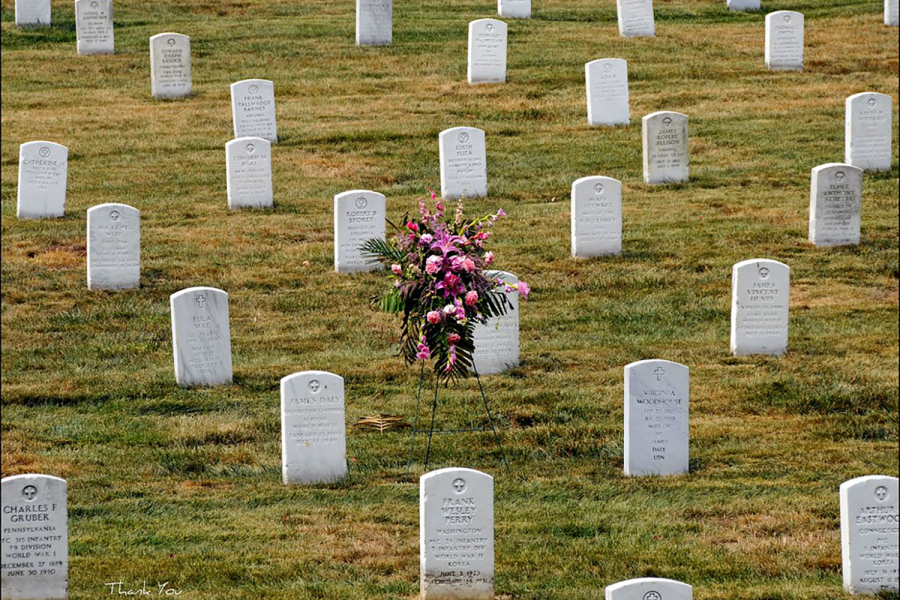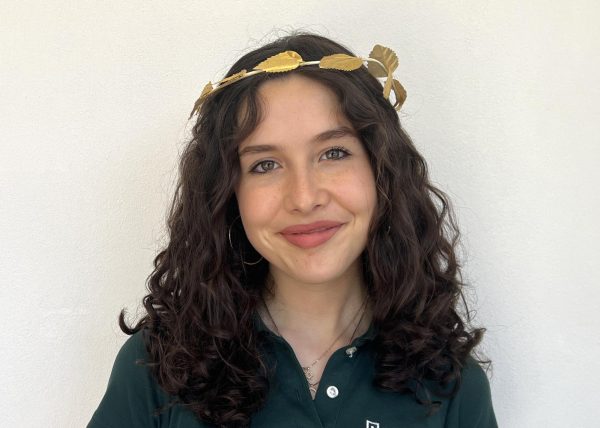Op-Ed: There are lives behind the death toll
Photo credit: Tony Fischer Photography, licensed under CC BY 2.0
Every number of a death toll generates the same image for a person: a dead body. Stopping to consider the lives and suffering of each person in that number will create the empathy we need to act as a community. “Arlington National Cemetery Graves (Burial Criteria)” by Tony Fischer Photography is licensed under CC BY 2.0.
September 30, 2022
The classic apocalypse setting displays zombies spreading disease, gas masks universally dispersed, burning buildings collapsing, dead civilians lying in streets and routine emergency national broadcasts. These fictitious scenes have been used for decades in American films but, when looked at closely, resemble our current world more than you realize.
The zombies are the millions of people infected with COVID-19. The Centers for Disease Control and Prevention (CDC) continues to recommend wearing a mask almost 34 months after scientists first detected COVID-19. The dead lie in hospital beds — the toll reaching the millions. Mass shootings continue to destroy schools and break communities. A war is raging in Ukraine, destroying countless cities and homes. After every catastrophe, we get our routine national address from a solemn President Biden: “Enough.” Again and again and again.
In our current world, we are updated daily with the latest tragedies. Confused teenagers are slapped with contrasting statistics from different news sites and, with limited concrete facts to lean on, create rumors faster than they consume news. Whether in a history class or on Twitter, younger and younger kids are being exposed to the horrors of our world. Many times, they don’t get the privilege of truthful information.
Abdul Haleem Muhammad’s Instagram post, titled “One Black Man’s Opinion,” comments on America’s immoral cycle of tragedy. A mass shooting occurs and people leap to spread disinformation. This leads to an initial public shock, which inevitably turns into fake empathy. America being America, the issue then becomes political. No one can agree enough to take action, and we forget.
We forget, if only for a second, in the midst of the next disaster. Did you forget about the three billion animals killed in the Australian fires in 2020? Did you forget about the Afghan women whose rights to employment and education were stolen by the Taliban? How could you forget?
It’s hard to feel “the right way” when our weekly schedule looks like this:
Wednesday, Sept. 14: “Florida Flies 2 Planeloads of Migrants to Martha’s Vineyard.”
Sunday, Sept. 18: “Catastrophic’ damage, power outages as storm pummels Puerto Rico.”
Monday, Sept. 19: “Russian missile strikes close to nuclear plant, Ukraine says.”
How do these disasters make you feel? Most people rush to respond: Angry. Horrified. Devastated. But internally, you feel something different: nothing.
Why don’t you feel anything anymore?
For 60 years, Paul Slovic, a psychologist at the University of Oregon, has researched “psychic numbing.” The title says it all: the more who die, the less we care. If it sounds selfish to you, you’ve hit it spot on, but this phenomenon is in our subconscious nature.
Slovic found that people normally think based on intuition as a survival mechanism. Without basing thoughts on logic to allow time to consider the deeper meaning of a fact, we cannot translate the piling numbers into piling bodies. Even though everyone who died had a life, a family and potential, your mind can’t truly understand the impact of it.
This is heightened for teenagers drowning in the chaos of the contemporary world. The pandemic isn’t the only threat killing people, as others include the climate crisis, police brutality, racially motivated attacks and wars. This psychic numbing leads to baseless political debates limiting our ability to take any action after a disaster.
So how can we learn to understand?
Don’t just guilt yourself. We have to push the numbers aside and think about the people behind the statistics. Intimate human experiences create a shared feeling from one human to another.
The most effective news stories right now are the spotlights on families; the story of Stacey Hightower who lost her husband to COVID-19 in December 2020. The story of Ukrainian mom Aleksandra Makoviy who scribbled her contact onto her 4-year-old daughter’s bare back in horror that they would be separated. The story of Alexandria Aniyah Rubio, a 10-year-old hoping to become a lawyer who made the honor roll the day she was murdered in Uvalde.
After we learn to foster this empathy for the people who are suffering, we can take one step forward: gratitude.
When you complain about the food on your plate, remember that some mothers struggle to feed their kids. When you complain about having to go to school, remember that not everyone gets the luxury of a high school education. When you complain about how annoying your mom is, remember the people without one. We are all humans, but privilege seems to dim the value in our minds. Instead of wallowing in this privilege, use it to do good.
“In the face of demoralization, gratitude has the power to energize,” Robert Emmons said in his novel on cultivating gratitude. “In the face of brokenness, gratitude has the power to heal. In the face of despair, gratitude has the power to bring hope.”









